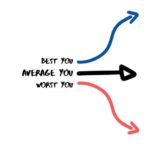Click to play the audio version of this article
Part 1: The View From My Couch
In the summer of 2016, I found myself on the couch watching the Canadian Men’s Volleyball Team compete at the Rio Olympics. It was the first time the team had qualified in 20 years. It was a momentous occasion for Canadian volleyball and everyone was excited.
Over the two weeks of the Olympics, a particular emotion began to develop within me. As I sat there on the couch nearly every day, I couldn’t help but begin to notice a hint of jealousy creeping in.
Any time an athlete’s information would flash across the screen, I couldn’t help but take note of their age. An 18-year-old swimmer. A 23-year-old gymnast. A 30-year-old rower. And most notably a 25-year-old volleyball player.
In fact, the Canadian volleyball team was comprised mainly of guys that were either my age or very close. Some of these guys even played with me on my university team. A lot of them are also around my height, my size, and my physical strength. On paper, we are pretty much identical.
Yet, there I was, sitting on my couch. And there they were, at the Olympics.
What the hell happened?
. . .
When you think of the word “sports”, what comes to mind? Entertainment, money, teammates, fun, frustration, love, fear, balls?
When I think of the word “sports” I find a sense of comfort. I think of teamwork, sweat, strength, glory, and an overwhelming sense of accomplishment.
I have spent the vast majority of time on this planet immersed in the sports culture. Growing up I tested out and played every sport there was available. I lived for the competition. Winning was always the goal.
If you’re a high-level athlete, there’s a good chance your early years looked something like this: Growing up you were always one of the fastest kid in your school. Every sport you tried, you would have some success and excel quicker than others. When you did eventually specialize in a sport, you were probably one the best in your local district. Plain and simple, you were an athlete. Always have been, and most likely, always will be.
Sound familiar? Keep reading…
But as you got older and moved up within each sport you played, something troubling happened. The pool of players increased. And not only did it get bigger, but the competition got better. With every step up, the skill required just to be “average” became increasingly more difficult to achieve.
Just being tall, fast, or “athletic” was no longer enough. You had to adapt — or accept the inevitability of becoming average
This is a moment every athlete will face. Heck, it’s not just athletes — nearly everyone will come face to face with this crossroad. We come to point where we realize just going through the motions is no longer enough.
For me, I wasn’t ready for that choice. I would rather thrive on my natural born traits. I would rather use my physicality and try to win with brute force. Unfortunately, in a sport like Volleyball, brute force is not always the answer.
Long story short. This mentality got me further than one would expect. I was lucky enough to get recruited onto one of the best volleyball teams in the country. With that, came a vast number of upsides. We had a great coach, amazing team culture, and a collection of some of the best players in the country.
The last of these was certainly a positive and had so much potential to allow me to succeed. Instead, I let it become my downfall.
. . .
Here’s where I went wrong:
In my early years, I wasted my time as a bench player. As far as I was concerned, I simply needed to wait it out, and one day, when I was “old enough” I would be a starter. I didn’t think about trying to beat out anyone. I just worked as hard as I needed to, but never harder than was necessary.
Well… soon enough, I got “older”. And low behold, I wasn’t ready.
To sum it up nicely, my final year consisted of a lot of frustration, bitterness, and regret — I was fighting every week for my starting position and ended up splitting time with an arguably better 2nd-year player.
Not much could be done at that point and some young buck was showing me first hand all the mistakes I had made in the past. He proved my preconceived notions wrong and capitalized on my complacency.
I had failed, and to be honest, it took me a long time before I could fully understand why. But after some overdue reflection — I get it now. I see where I went wrong.
If you’re still a young athlete, I don’t want you to follow in my footsteps. I want you to succeed. I want you to realize that you are capable of so much more than you think. The only thing holding you back is YOU.
Regret is a powerful emotion, but the hardest part about regret is that we cannot feel it’s full weight until it arrives. My hope is that you can sense my regret, that you can realize the importance and urgency of what I am about to pass onto you.
In the next part, I have laid out what I see as some of the most destructive reasons as to why I failed to reach my athletic goals. And more importantly, I have outlined some helpful ways you can correct your path to put you on a more focused journey.
. . .
One more thing I’d like to address: As I read back and review everything I’ve written so far, I’m starting to notice a somewhat troubling similarity. With all these hypothetical “what if’s” and “what could have been’s” that I’m tossing around, I’m beginning to sound a lot like Uncle Rico.

The washed-up athlete who can’t let go. It’s a risky label to give myself. Our culture has turned this line of thinking into somewhat of a running joke. We laugh at the desperation and pettiness that comes with such a mentality. We have labelled these people as “stuck in the past”; which, yes, to a certain extent they are.
But for those of us who are looking to improve ourselves, there is a valuable lesson to be learned from people like myself and Uncle Rico: Don’t make our same mistakes or history is destined to repeat itself.





